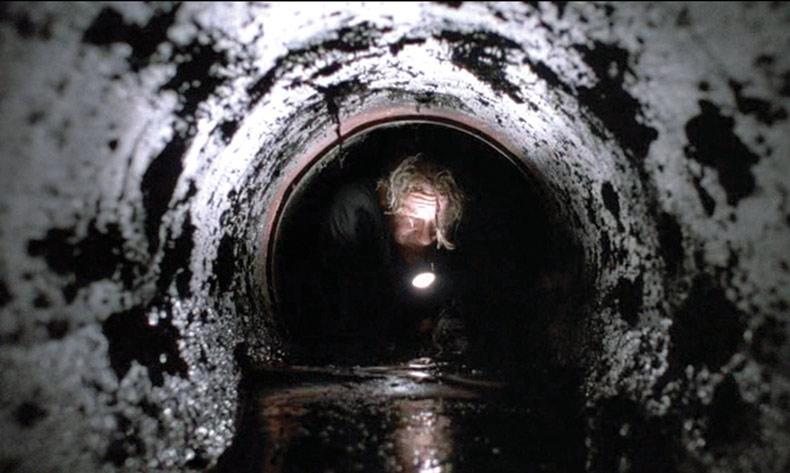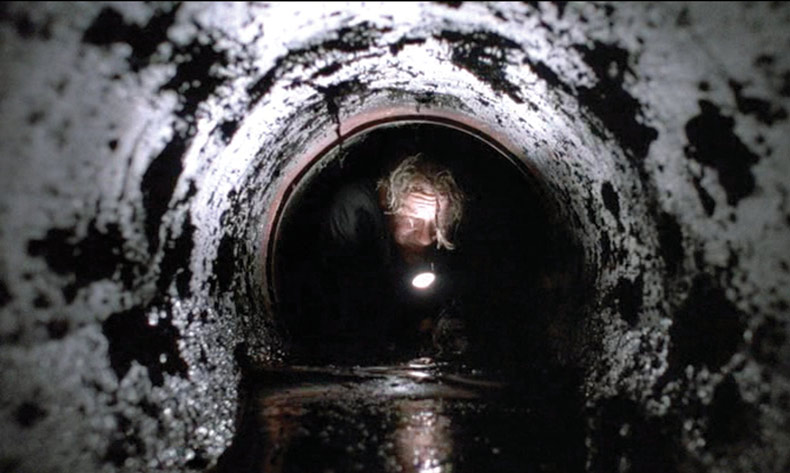Andy Dufresne crawled to freedom through five hundred yards of shit-smelling foulness I can’t even imagine, or maybe I just don’t want to. Five hundred yards, that’s the length of five football fields.
~ Ellis Boyd “Red” Redding
The Shawshank Redemption is on my Mount Rushmore of movies.
Google “most rewatchable movies” and you will find Shawkshank on every list, poll and survey.
Like all great story arcs, Shawshank drags its protagonist through an unending series of trials, torture and heartbreak. The length of this movie only serves in prolonging the punishment of its hero.
Andy Dufresne, a normal guy who makes a terrible mistake, finds himself trapped by a sadistic warden with no intention of letting him leave.
Andy’s misery heightens the payoff of his retribution. In the climactic scene of the film, Andy escapes through a sewage pipe during a driving rainstorm.

He is vividly pictured crawling on his stomach through an endless procession of human waste before spilling out into a river on the outside.
We learn that Andy’s big moment was twenty years in the making. With a small rock hammer, he carved out a tunnel in his cell pebble by pebble.
For two decades, he carved out a handful of rock and then carried it out to the yard in his pocket and dropped it. Every day, another small handful of rock.
He did this with no certainty that his plan would work.
- What if his Raquel Welch poster fell and a guard found the tunnel?
- Could the warden move his cell after he tunneled for 15 years?
- What if he got to the other side and couldn’t get into the pipe?
No other movie makes me think about resilience like Shawshank. The lesson in Andy’s persistence applies to many aspects of success.
To achieve something extraordinary, you must be willing to grind for much longer than everyone else.
“Everyone Wants A Quick Fix”
When I took my first management role, I jumped in my company Ford Taurus and drove from Chicago to Kansas City.
I wanted to learn from a leader that I respected. Don was 35 years older than me, his team loved him and he never appeared to be stressed.
He was a manager I admired from afar and I wanted his success. I wanted my team to admire me as they admired him. Most of all, I wanted my team to perform like his.
I spent a day with Don and took pages of notes. He was gracious with his time and made me feel like I was the most important part of his day.
He answered hundreds of my questions patiently. I wanted to crack his code and didn’t have 35 years to figure it out. I needed shortcuts.
Before I left, he told me to forget everything I wrote down but one thing.
“If you want to be a good manager, learn how to connect with people. If you can’t, nothing else matters. Buy Carnegie’s CD series on influence and listen to that instead of the radio when you are stuck on the road. Listen to Carnegie every day and the principles will become second nature.”
I took pages of notes that day but didn’t write that down. Of more interest were the spreadsheets he used to track forecasts. I wanted his list of interview questions and other frivolous tools that helped him manage a team.
I saw Don four months later. He asked how I liked the Carnegie series. Embarrassed, I admitted that I hadn’t gotten around to it.
Don smirked and said, “Everyone wants a quick fix.”
Shame.
I went to KC for easy fixes that would help me succeed quickly. When Don gave me advice that involved real work, I passed.
I was determined not to disappoint him again. That CD set became my background music for the next three years.
I logged thousands of miles in that management role. Driving through Wisconsin, Minnesota, Ohio and Indiana, I listened to Carnegie’s advice on connecting with people.
There was always something new to learn, a topic that was fresh for a situation I was currently dealing with. Slowly and methodically, that set of CD’s made me better with people.
Rather than listening to ESPN, I listened to a coach who always seemed to know the challenges I faced with my team.
- “To be interesting, be interested.”
- “Talk only in terms of the other person’s interests.”
- “Make the other person feel important, and do it sincerely.”
I remember those lessons which helped me grow into a better leader. There was no hack to becoming a good manager.
Only a long, grinding process of study, practice, correction and repetition.
“That kid has a natural swing.”
My neighbor has an 8-year old who loves baseball. For five years, I’ve watched this kid hit baseballs off of tee in his front yard.
As soon as he could walk, he was swinging a bat. He swings that bat every day after school. He swings all summer long. When I come home from the office, he is swinging.
Ping. Ping. Ping.
That sound is like the rooster of our neighborhood on Saturday morning. Kyle is hitting baseballs, the sun must be up.
Our little league tryouts took place this weekend. A few hundred kids showed their stuff in front of 50 coaches. Naturally, Kyle made a big impression. One coach remarked to me after seeing Kyle swing.
“Damn. He can really hit.”
“For sure. He’s my neighbor.”
“That kid has a natural swing.”
Right.
If “natural” is defined by doing something 100,000 times over, then Kyle’s swing fits that definition. Every 8-year-old boy at that tryout wished they could hit the ball like Kyle. But how many are willing to pay that price?
Exclusive clubs are reserved for those who put in the work.
“Hey, how can I write for Forbes?”
Shortly after retiring from a big company, I decided that I wanted to write. I have 20 years of crazy stories rumbling around in my head and writing could be a fun way to share.
I started by answering questions on Quora.
No one paid attention. After posting 15–20 articles with zero engagement, I determined that I wasn’t writing for the right audience.
I noticed one author on the site also wrote for Forbes. Now, that would be an audience that might appreciate what I had to say.
So I sent a direct message to this author. After giving a brief introduction, I got right to business.
“Hey, how can I write for Forbes?”
This question was loaded with hubris. I had no writing credentials but expected a major publication to pick me up.
She was gracious enough to respond.
“I wrote on my blog for seven years before someone from Forbes took notice. My advice is to be consistent, stick to a subject where you can build a following and don’t lose hope when it is slow in the beginning.”
I hated this answer.
I was hoping for the name and email address of a senior editor that I could reach out to. If only I had a contact, they would see that Forbes needs more writers with executive experience.
I reached out to other writers and heard similar answers from all of them. If I wanted to write, I needed to put in the work.
That’s exactly what I did every day for the next year. I put days into some long articles that flopped. During some stretches, I might publish 7-8 articles in a row that no one read but my mom.
But with consistency, I improved as a writer and started to build a following. Several articles went viral on the site and the following grew. After several hundred articles, I had a following of 10,000 readers and my writing had over 10,000,000 views on the site.
And just as the writer predicted, someone from Forbes started to follow my writing. Within a few months, I had a contract to publish directly to Forbes.com.
The path was filled with frustration, anxiety and at least 100 different moments when I decided that I didn’t want to write anymore.
Nothing Worth Having Comes Easy
Andy Dufresne’s plight in Shawshank Redemption resonates with us because it speaks to a simple truth. Any aspirational goal requires a price that few are willing to pay.
I work with startup owners and they are consistent in recalling the early days of their business. It can be miserable.
- Products don’t match their vision.
- Customers aren’t as interested as they predicted.
- Every job in the company falls on their shoulders.
These owners will also tell you that success can’t happen without the toil. We don’t learn from success that is given to us.
The same is true for those working for a company.
- Great salespeople will explain a period in their career when no one was interested; when the phone didn’t ring.
- Managers who build great teams can point to an early management job when they did everything wrong.
- People who find their “dream job” have worked enough terrible jobs to know how good they have it.
If you want something bad enough, there won’t be a shortcut. Success has a way of making us crawl first.
Everyone wants to escape from Shawshank, but few are willing to crawl through shit.
To follow my writing, join the newsletter and receive updates directly to your inbox when I publish new content.
We value your privacy and will never spam you.
